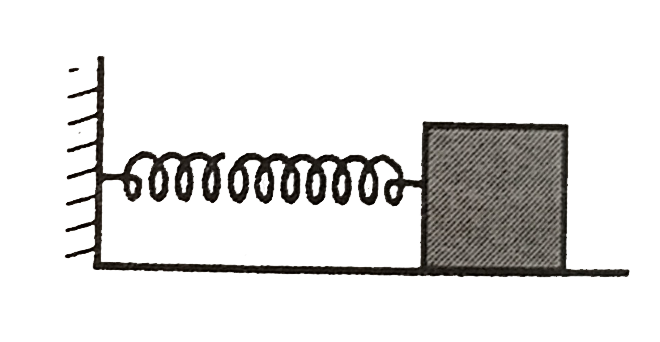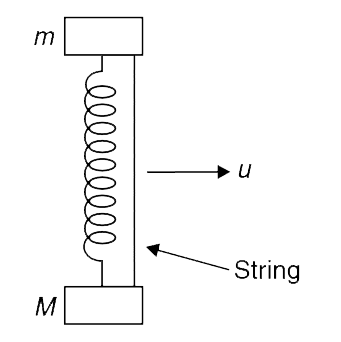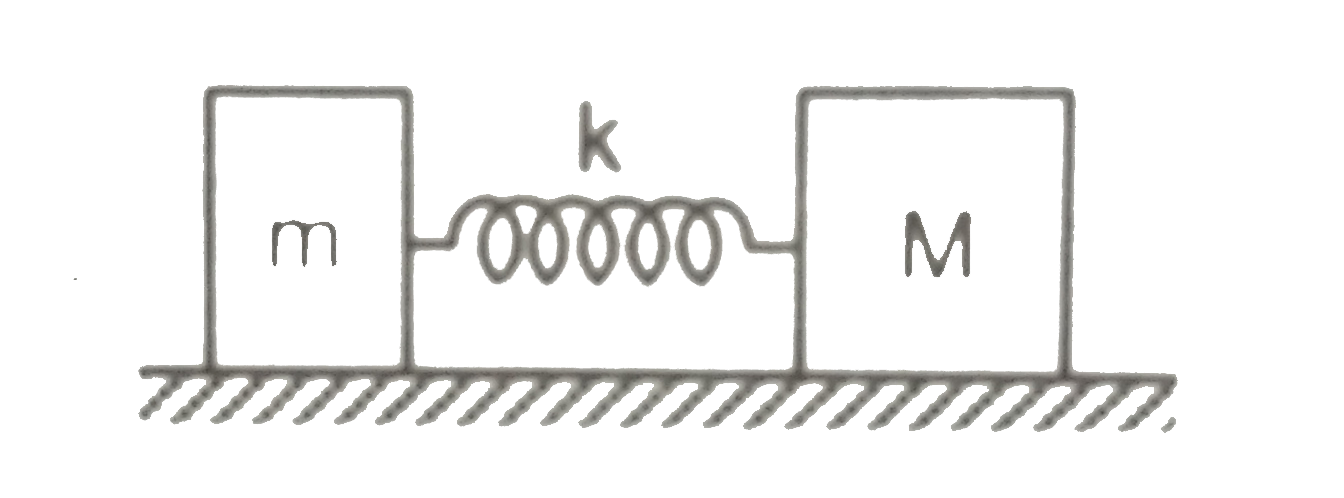A light spring of force constant 'K' is held between two blocks of masses 'm' and '2m'. The two blocks and the spring system rests on a smooth horizontal floor. Now th blocks are moved towards each other compressing the springs by 'x' and suddenly released. The relative velocity between the blocks when the spring attains its natural length will be
(√3K2m)x
(√2K3m)x
(√K3m)x
(√K2m)x
The correct Answer is:(1)
Using reduced mass concept, μ=m1m2m1+m2
12μv2=12kx2
Topper's Solved these Questions
Similar Questions
Two blocks A and B of mass m and 2m respectively are connected by a light spring of force constant k. They are placed on a smooth horizontal surface. Spring is stretched by a length x and then released. Find the relative velocity of the blocks when the spring comes to its natural length

View SolutionTwo blocks A and B of masses m and 2m, respectively , are connected by a massless spring of force constant k and are placed on a smooth horizontal plane. The spring is stretched by an amount x and then released . The relative velocity of the blocks when the spring comes to its natural length is

View Solution
Knowledge Check
A spring block system is placed on a rough horizontal floor. The block is pulled towards right to gives spring some elongation and released, Then :
 Athe block may stop before the spring attains its natural lengthBthe block must stop with spring having some compressionCthe block may stop with spring having sme compressionDit is not possible that the block stops at mean position
Athe block may stop before the spring attains its natural lengthBthe block must stop with spring having some compressionCthe block may stop with spring having sme compressionDit is not possible that the block stops at mean positionA spring block system is placed on a rough horizontal floor. The block is pulled towards right to give spring some elongation and released.
 AThe block may stop before the spring attains its natural lengthBThe block must stop with spring having some comprission.CThe block may stop with spring having some compression.DIt is not possible that the block stops at antural length of the spring.
AThe block may stop before the spring attains its natural lengthBThe block must stop with spring having some comprission.CThe block may stop with spring having some compression.DIt is not possible that the block stops at antural length of the spring.An ideal spring is permanently connected between two blocks of masses M and m. The blocks-spring system can move over a smooth horizontal table along a straight line along the length of the spring as shown in Fig.The blocks are brought nearer to compress the spring and then released. In the subsequent motion,
 Ainitially they move in opposite directions with velocities inversely proportional to their massesBthe ratio of their velocities remains constantClinear momentum and energy of the system remain conservedDthe two blocks will Oscillate about their centre of mass which remains stationary
Ainitially they move in opposite directions with velocities inversely proportional to their massesBthe ratio of their velocities remains constantClinear momentum and energy of the system remain conservedDthe two blocks will Oscillate about their centre of mass which remains stationary
Two blocks A and B of masses m and 2m respectively are connected together by a light spring of stiffness k and then placed on a smooth horizontal surface. The blocks are pushed towards each other such that spring gets compressed by a length x0 and then released from rest. Find the work done on the block A by the spring, by the time the spring acquires its natural length.
View SolutionTwo blocks of masses m=2kgandm=8kg are connected to a spring of force constant K=1kN/m. The spring is compressed by 20cm and the two blocks are held in this position by a string. The system is placed on a horizontal smooth surface and given a velocity u=3m/s perpendicular to the spring. The string snaps while moving. Find the speed of the block of mass m when the spring regains its natural length.

View SolutionA light spring of spring constant k is kept compressed between two blocks of masses m and M on a smooth horizontal surface. When released, the blocks acquire velocities in opposite directions. The spring loses contact with the blocks when it acquires natural length. I fhte spring was initially compressed through a distance d find the final speeds of the two blocks.

View SolutionA block of mass 2kg is on a smooth horizontal surface. A light of force constant 800N/m has one end rigidly attached to a vertical wall and lying on that horizontal surface. Now the block is moved towards the wall compressing the spring over a distance f 5cm and then suddenly released. By the time the spring regains its natural length and looses contact with the block, the velocity acquired by the block will be
View SolutionTwo blocks each of mass m are joined together using an ideal spring of force constant K and natural length l0 . The blocks are touching each other when the system is released from rest on a rough horizontal surface. Both the blocks come to rest simultaneously when the extension in the spring is l04. The coefficient of friction between each block and the surface (assuming it to be same between any of the blocks and the surface) is :
View Solution
